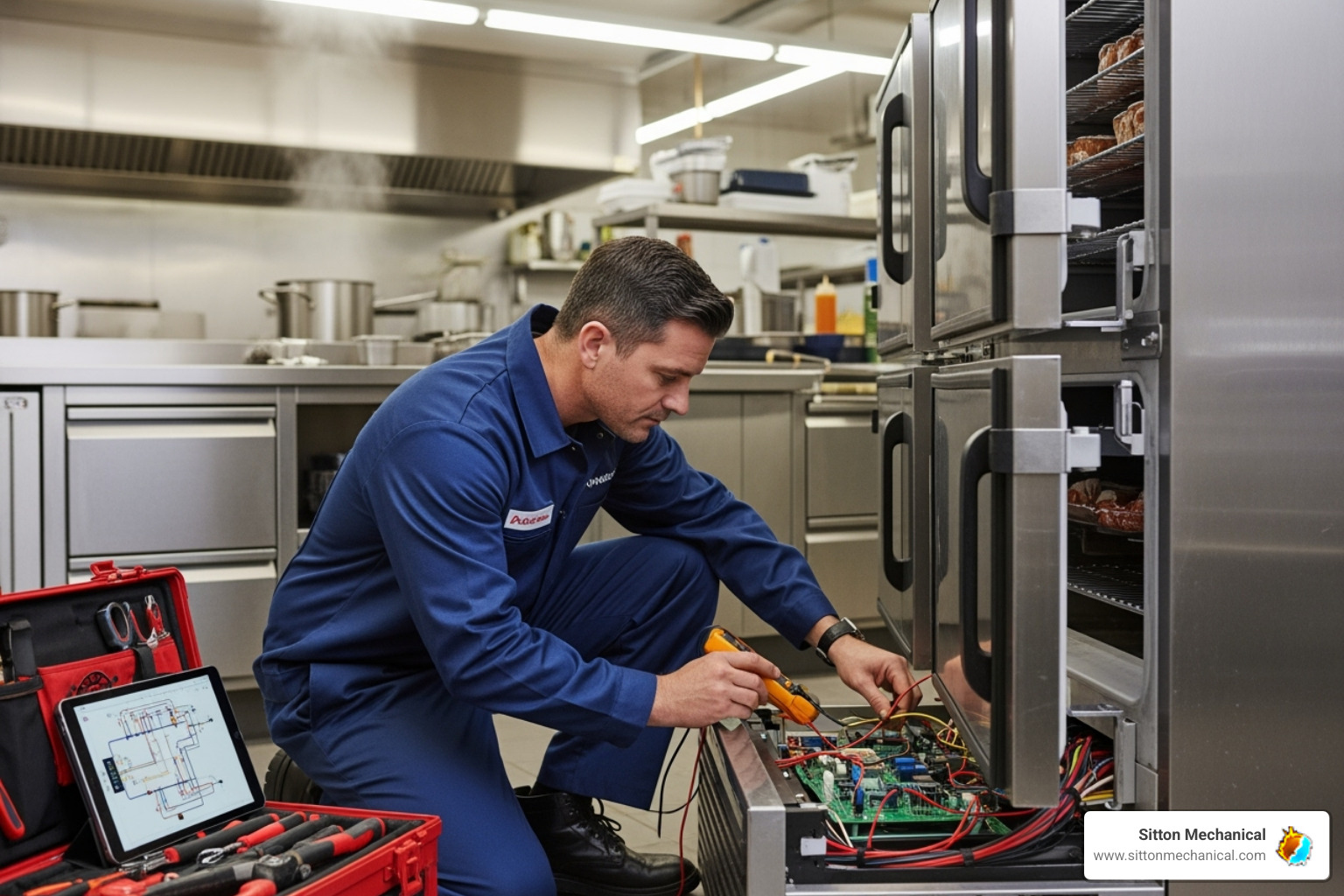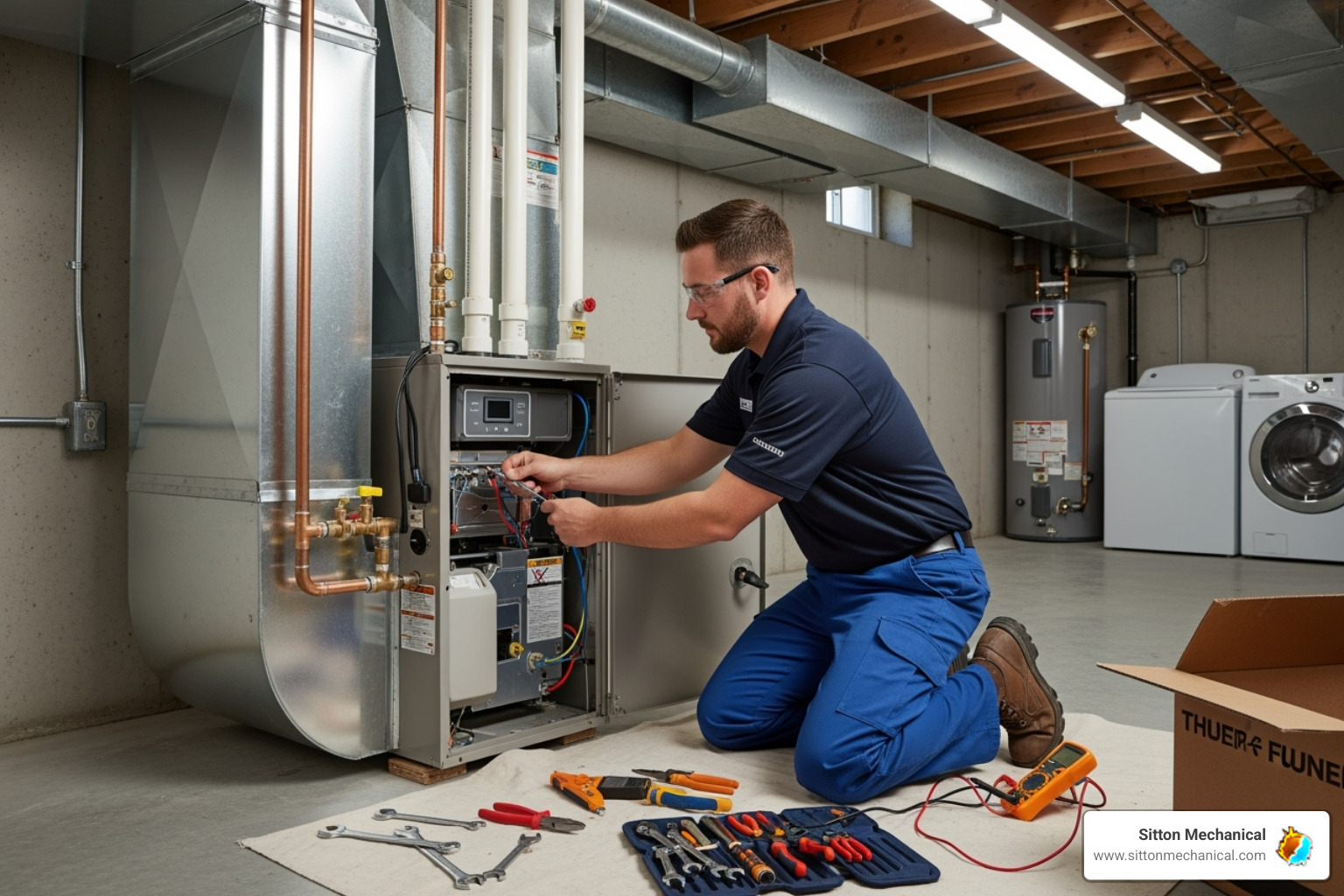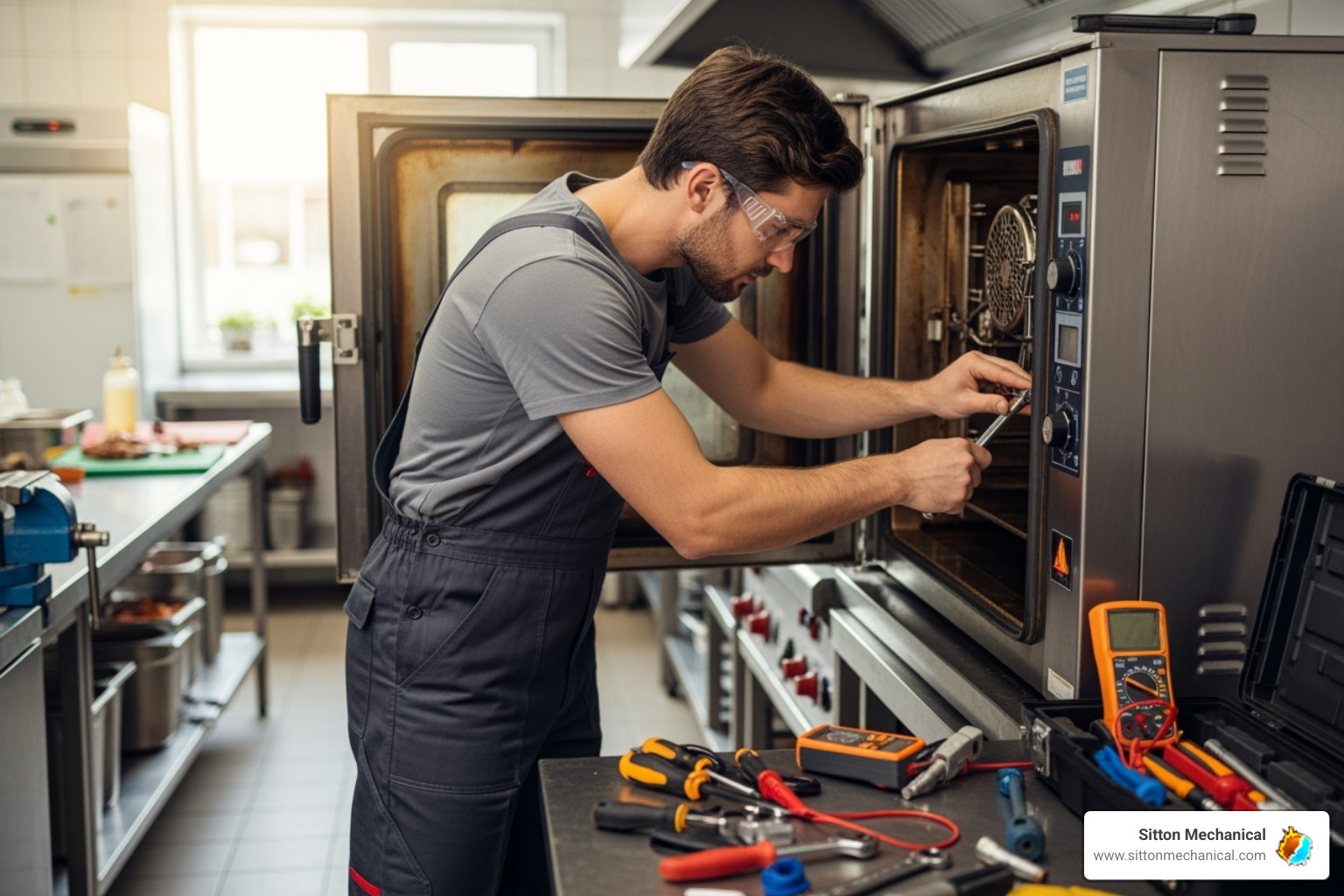When Your HVAC System Not Heating Becomes a Winter Nightmare
When your HVAC system not heating properly, it can quickly turn your home uncomfortably cold. Cranking up the thermostat only to feel a rush of cold air is a frustrating experience that no homeowner wants.
Quick Solutions for HVAC System Not Heating:
- Check thermostat settings - Ensure it's set to "HEAT" and the temperature is above room temp.
- Replace dirty air filter - Clogged filters are a leading cause of heating failures.
- Verify power supply - Check circuit breakers and furnace switches.
- Inspect pilot light - Relight if extinguished (for gas furnaces).
- Clear blocked vents - Remove furniture or debris from registers.
- Reset the system - Turn it off for 5 minutes, then restart.
- Call a professional - If these steps don't work or you smell gas.
The good news is that many heating problems have simple solutions that don't require an expensive service call. This guide will walk you through the most common causes and fixes for any heating system.
You don't need to be an HVAC expert to diagnose basic issues. With these simple troubleshooting steps, you can often restore warmth to your home yourself. We'll cover everything from quick DIY checks to recognizing when it's time to call in the professionals for help.
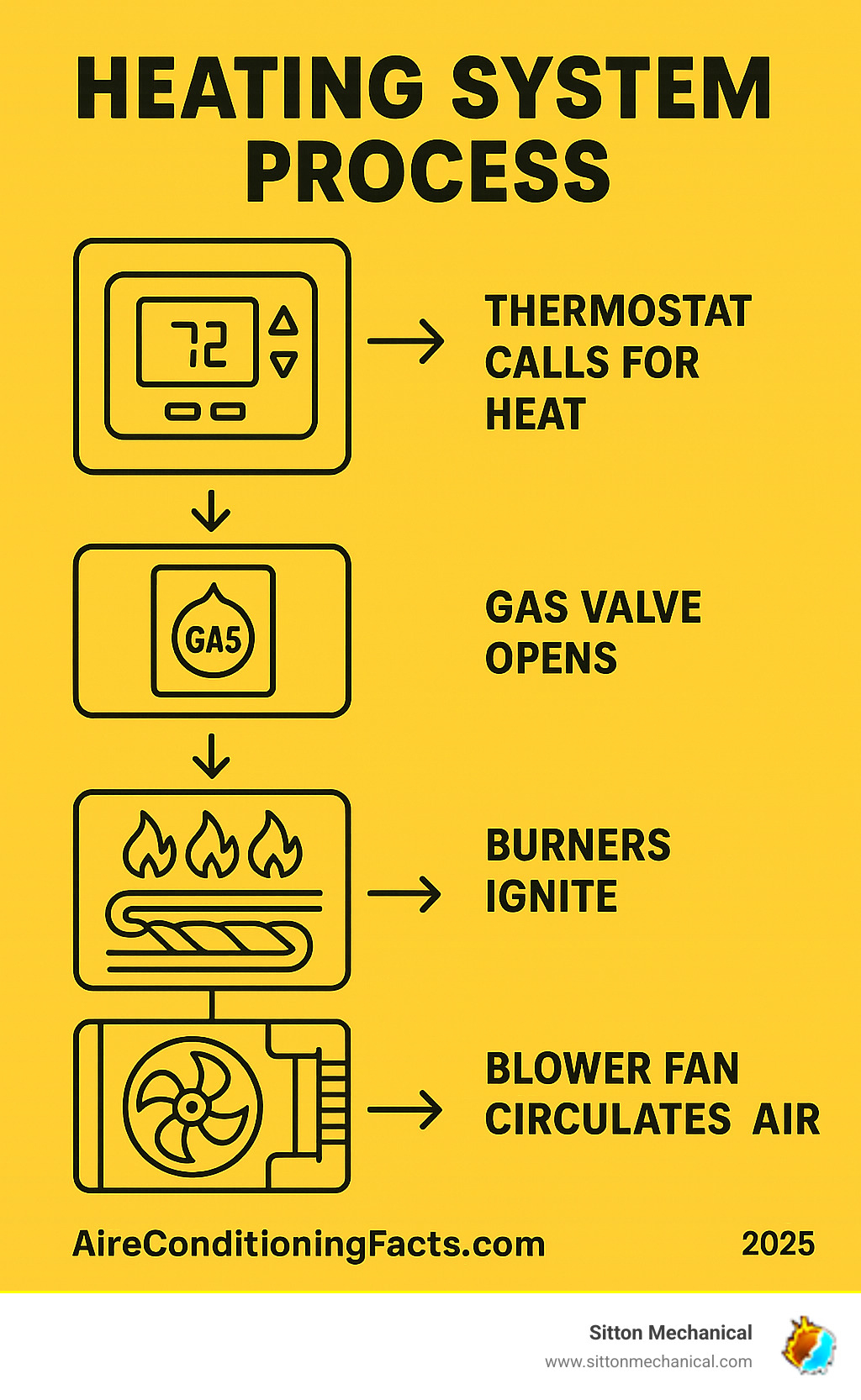
Simple DIY Checks: Your First Line of Defense
Before calling for professional help, perform these simple checks. They are often the quickest path to restoring warmth to your home.
1. Incorrect Thermostat Settings
Your thermostat controls your HVAC system, so incorrect settings are a common reason for your HVAC system not heating. Always check it first.
- Mode: Ensure the thermostat is set to 'HEAT', not 'COOL' or 'OFF'.
- Temperature: The set temperature must be higher than the current room temperature.
- Fan: Set the fan to 'AUTO'. The 'ON' setting makes the fan run continuously, which can blow cool air between heating cycles.
- Power: Replace the batteries if your thermostat uses them. For smart thermostats, try restarting the unit if it's unresponsive.
For more details on your system, you can find more info about residential heating options.
2. Power Supply and Circuit Breaker Issues
Your HVAC system needs electricity to run. If it's completely unresponsive, a power issue is a likely suspect.
- Furnace Power Switch: Find the switch on or near your furnace unit and make sure it's in the 'ON' position. It looks like a standard light switch and can be flipped off by accident.
- Circuit Breaker: Go to your home's electrical panel and look for the breaker labeled for your furnace or HVAC. If it's tripped (in the middle or 'OFF' position), flip it firmly to 'OFF' and then back to 'ON'. If it trips repeatedly, call a professional, as this indicates a more serious electrical problem.
- Access Panel: The furnace access panel must be securely closed. A safety switch prevents the unit from running if the door is ajar.
- Outdoor Disconnect (Heat Pumps): For heat pumps, check the power disconnect switch near the outdoor unit and ensure it is on.
3. Clogged Air Filters: The Silent Saboteur
A clogged air filter is a critical and common reason your HVAC system not heating properly. A filter packed with dust, pet hair, and other debris severely restricts airflow, forcing your furnace to work much harder.
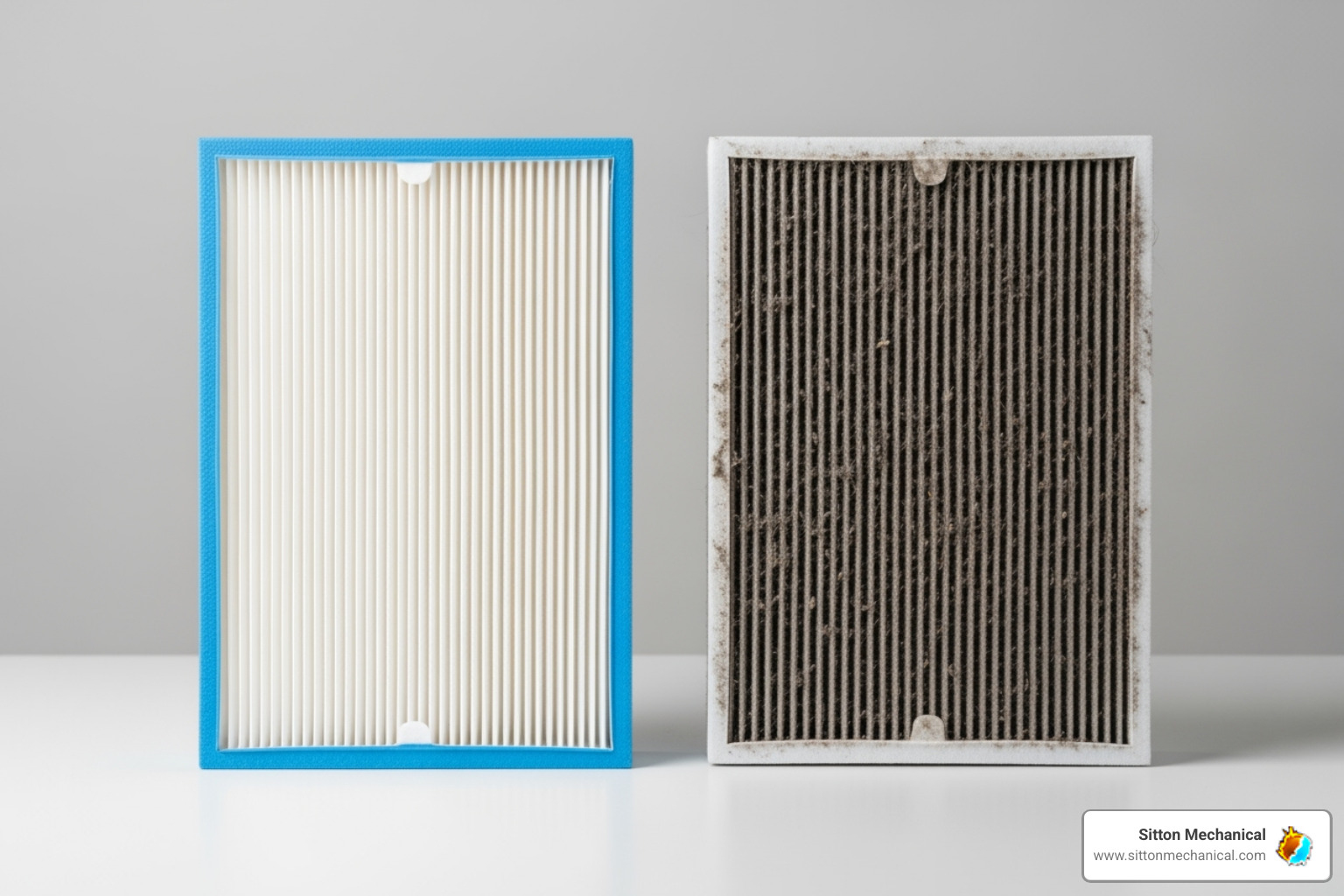
This restricted airflow can cause the furnace to overheat. When this happens, a safety device called the high-limit switch shuts down the burners to prevent damage. The fan, however, continues to run, pushing unheated, cool air through your vents. This makes it seem like your furnace is broken when it's actually just protecting itself.
How Often to Replace Your Filter:
- General Rule: Every 1-3 months.
- With Pets or Allergies: Monthly changes are recommended, as pet dander and allergens clog filters quickly.
- Dusty Environments: If you live in a dusty area like Oklahoma or are doing renovations, check your filter monthly.
A simple test is to hold the filter up to a light. If you can't see light through it, it's time for a replacement. Replacing the filter is an easy task: locate the filter slot, slide the old one out, and insert a new one of the same size, making sure the airflow arrow points in the correct direction.
For more guidance, see our HVAC Air Filter Tips Stillwater. This small task can prevent major heating issues.
Common Furnace Problems Causing an HVAC System Not Heating
If basic checks don't solve the problem, the issue may lie deeper within the furnace itself. Understanding these common failures can help you identify what's wrong.
4. Ignition System Failures
If your furnace sounds like it's running but produces no warmth, the ignition system may have failed, leaving your HVAC system not heating.
- Pilot Light: Older gas furnaces use a small, constant flame called a pilot light. If it goes out, it can often be relit by following the instructions on the furnace. Safety Warning: If you smell gas, turn off the gas supply immediately, leave the area, and call a professional. Do not try to relight the pilot.
- Electronic Ignition: Modern furnaces use electronic systems. A common issue is a dirty flame sensor, a safety rod that confirms a flame is present. When dirty, it can't detect the flame and shuts the system down. While cleaning it can be a DIY job, you can find instructions here: how to clean your flame sensor.
- Other Failures: Cracked hot surface ignitors or faulty thermocouples also prevent ignition and require professional replacement.
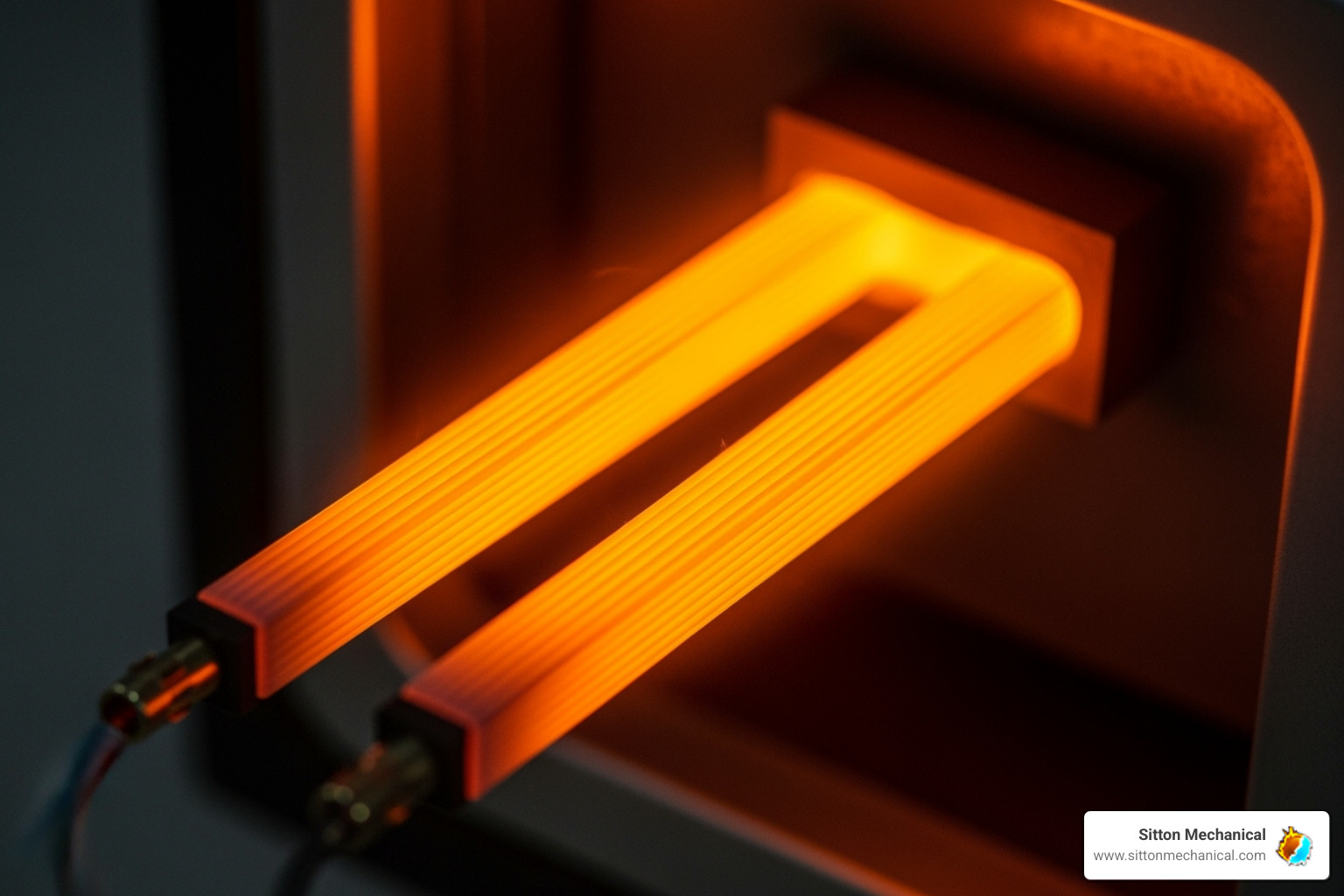
5. Blocked Burners or Fuel Supply Issues
Your furnace can't produce heat without fuel or with clogged burners.
- Clogged Burners: Over time, soot and debris can build up on the burners, blocking gas flow and leading to weak or no flames. This can also cause incomplete combustion, which is inefficient and can produce dangerous carbon monoxide.
- Fuel Supply: For gas furnaces, check that the main gas valve is open (handle parallel to the pipe). For oil or propane systems, ensure you haven't simply run out of fuel.
Blocked burners can lead to serious safety issues. Learn how to Detect Furnace Issues Early to prevent major problems.
6. An Overheating Furnace
An overheating furnace will shut itself down to prevent damage, a behavior known as short cycling. This results in the system blowing cool air after running for only a short time.
Common causes of overheating include:
- Dirty Air Filters: As discussed, this is the number one cause.
- Blocked Vents: Ensure all supply and return vents are open and not blocked by furniture or rugs.
- Failing Blower Motor: An old or failing motor can't move enough air to cool the heat exchanger, leading to a shutdown.
The system's high-limit switch is what triggers this safety shutdown. If your furnace is short cycling even after you've checked filters and vents, it's time to call a professional. These are clear Signs You Need HVAC Repair.
Heat Pumps, Ductwork, and Other System-Wide Issues
Sometimes, the issue isn't the furnace but another part of your HVAC system. Heat pumps, ductwork, and insulation can all be culprits when your home won't warm up.
7. Heat Pump Specific Problems
Heat pumps don't create heat; they move it from outside into your home. This unique process means they have their own set of potential problems when your HVAC system not heating.
| Problem Type | Furnace Heating Problem | Heat Pump Heating Problem |
|---|---|---|
| Heat Production | Pilot light/ignitor failure, blocked burners, no fuel | Low refrigerant, frozen outdoor unit, reversing valve failure |
| Air Delivery | Clogged filter, blower motor issues, blocked vents | Clogged filter, blower motor issues, blocked vents, defrost mode |
| Electrical/Safety | Tripped breaker, high-limit switch, loose connections | Tripped breaker, defrost control board, sensor issues |
| Common Symptoms | No heat, short cycling, burning smell | Blowing cold air, icing up, long run times, reduced efficiency |
- Low Refrigerant: A refrigerant leak is a common issue. Signs include the system running constantly without reaching the set temperature or excessive ice on the outdoor unit.
- Defrost Mode Issues: It's normal for a heat pump to run a defrost cycle to melt frost on the outdoor unit, during which it may blow cool air for a few minutes. However, if the unit is covered in thick ice or the defrost cycle runs constantly, it needs professional service.
- Reversing Valve Failure: This valve switches the unit between heating and cooling. If it gets stuck in cooling mode, it will only blow cold air.
These issues typically require a professional. Learn more about What is a heat pump and how does it work? or explore our Geothermal Heating Guide.
Bonus: Leaky Ductwork and Poor Insulation
If your heating unit is working perfectly but your house is still cold, the warm air might be escaping before it reaches you.
- Leaky Ductwork: Gaps and cracks in your ductwork can leak heated air into your attic or crawlspace, leading to uneven heating and energy bills that are up to 30% higher. Check for obvious gaps or feel for air leaks around duct joints.
- Poor Insulation: Inadequate insulation in your attic and walls allows heat to escape, forcing your system to work harder. If you can see the ceiling joists in your attic, you likely need more insulation.
If you suspect these issues, a professional can help diagnose the problem. Learn more about when you might need service at The Need Heating Repair.
When to Call a Professional for Your HVAC System Not Heating
While DIY checks can solve many issues, some problems require a professional. Knowing when to call is crucial for your safety and to prevent more expensive damage.
Signs You Need an Expert for an HVAC System Not Heating
Call a professional if your HVAC system not heating is accompanied by any of these warning signs:
- Strong Gas or Burning Smells: A rotten egg smell (gas leak) or an electrical burning odor are emergencies. Turn off your system, evacuate the house, and call your gas company and an HVAC professional immediately.
- Loud Noises: Banging, grinding, or screeching sounds often indicate serious mechanical problems with the blower motor or other internal parts.
- Persistent Short Cycling: If the system continues to turn on and off rapidly after you've changed the filter and cleared vents, it points to a deeper issue.
- Water Pooling: Water around your indoor unit can signal a condensation drainage problem, which is a safety hazard near electrical components.
- No Heat After DIY Checks: If you've gone through all the basic checks and still have no heat, it's time for a technician with diagnostic tools.
If your system is over 15 years old and needs frequent repairs, a technician can help you decide if replacement is more cost-effective. For complex issues, trust our Expert HVAC Repair by Our Pros.
The Benefits of Regular HVAC Maintenance
Preventing breakdowns is the best strategy. Regular maintenance is an investment in your system's health and your family's comfort.
- Prevent Breakdowns: Technicians can spot and fix small issues before they cause a total system failure on the coldest day of the year.
- Improve Efficiency: Systems can lose about 5% of their efficiency each year without maintenance. A tune-up keeps it running efficiently, saving you money on energy bills.
- Extend Lifespan: Proper care helps furnaces last 15-20 years or more, protecting your investment.
- Ensure Safety: Technicians check for critical safety issues like carbon monoxide leaks, faulty wiring, and gas line problems.
Learn more about protecting your system by reading about Why Heating Maintenance is Essential.
Frequently Asked Questions about an HVAC System Not Heating
Here are answers to some of the most common questions we hear from homeowners in the Stillwater area during chilly Oklahoma winters.
Why is my furnace blowing cold air?
Feeling cold air from your vents when the heat should be on is confusing. Here are the most common reasons:
- Thermostat Fan is 'ON': If the fan is set to 'ON' instead of 'AUTO', it will blow air constantly, even between heating cycles.
- Overheating Furnace: A clogged filter can cause your furnace to overheat, triggering a safety switch that shuts off the burners while the fan continues to run to cool the unit down.
- Ignition Failure: On a gas furnace, a failed pilot light or electronic ignitor means the fuel isn't being lit to create heat.
- Heat Pump in Defrost Mode: A heat pump will temporarily blow cool air inside while it runs a normal defrost cycle to melt ice on the outdoor unit.
How often should I change my HVAC air filter?
The general rule is every one to three months. However, you should change it more frequently (likely monthly) if:
- You have pets.
- Someone in your home has allergies or asthma.
- You live in a dusty area or are doing home renovations.
- Your system is running constantly during peak season.
If you hold the filter up to a light and can't see through it, it's time for a new one.
What's the difference between a furnace and a heat pump?
Though they both heat your home, they work in fundamentally different ways.
- A furnace creates heat by burning fuel (like natural gas or propane) or using electric resistance coils. It then blows the heated air through your ducts. Furnaces are very effective in cold weather. Learn more about our Furnace Services.
- A heat pump moves heat from the outside air into your home. In the summer, it reverses the process for cooling. Heat pumps are highly efficient in moderate climates but can struggle in very low temperatures, often relying on a backup heat source.
Understanding the difference helps you make informed decisions about your home's heating system.
Conclusion: Restore Warmth and Comfort to Your Home
When your HVAC system not heating properly, it can be overwhelming. Fortunately, you are now equipped with the knowledge to tackle many common heating issues.
Always start with the basics: check the thermostat, replace the air filter, and verify the power. These simple steps solve the majority of heating problems. Understanding your system, whether it's a furnace or a heat pump, empowers you to make smart decisions.
However, know when to call for backup. For your safety, issues like gas smells, loud noises, or problems that persist after troubleshooting require professional expertise.
The best way to avoid future heating headaches is with regular maintenance. Annual tune-ups prevent major breakdowns, improve efficiency, extend your system's lifespan, and ensure safe operation.
At Sitton Mechanical, our certified technicians understand the frustration of heating problems during Oklahoma's winters. With over 10 years of experience serving Stillwater and the surrounding areas, we offer upfront pricing, guaranteed work, and flexible financing to get your heat restored without surprises.
Don't spend another night in the cold. For reliable HVAC contractor services in Stillwater, OK, schedule an appointment with our team today. We're here to restore the warmth and peace of mind your home deserves.
Ready to Transform Your Home?




